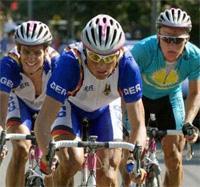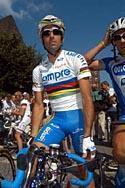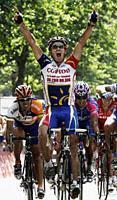
Recently on Cyclingnews.com |
The current time in Athens is 08:53 on July 19, 2025 - For current weather, click here
28th Olympic Games - JO
Athens, Greece, August 14-28, 2004
Map and profile Start list Live coverage Results
August 14: Men's Road Race, 224.4 km
The top one day riders in Athens showdown
By Tim Maloney, European editor
 |
Cycling has been a part of the modern Olympic Games since the beginning in 1896 and it's only fitting that the 224.4km Men's Olympic Road Race is the first medal event of the 2004 Olympiade. The Olympics is a unique event in the cycling universe, in that it's raced only every four years, providing few reference points for the competitors. Like the World Championship, the Olympics uses a national team format, but with fewer riders per squad, making the actual racing more difficult to control. Men's teams have a maximum of five riders, while women will have three per country on the starting line. With a broad participation of nations, the mix of experienced and inexperienced riders can sometimes cause problems
The men will race 17 laps of a 13.2 km parcours that is located entirely in central Athens. The somewhat selective Olympic road race circuit starts and finishes in downtown Athens in Kontzias Square, just in front of Athens City Hall, then loops through Omonoia Square. After 1km, there is a right hand turn with the next kilometre and a half on Alexandras Ave. uphill at a 2-3% gradient that passes the treasures of the National Museum, then becomes steeper and increases to 5% until a 150 degree right hand turn.
The next kilometre and a half heads down Ippocratous St., through the feed zone the base of the climb and Kolonaki Square and then hits the climb of Lycabettus Hill. This is a 2km ascent that heads up and around Lycabettus Park and landmark ancient Greek theatre. The first 500m of the ascent are steep, twisty and narrow with an average gradient of 8% with some points to 10%; a perfect place to attack. The climb then continues for another kilometre and change, then heads back down towards the center of Athens. This fast, tricky and somewhat steep descent plunges down through Lycabettus Park and onto Vassilisis Sophias Avenue to Synta Square and Amallias Ave., around the Greek Parliament and the National Gardens for three kilometres and then back up towards Acropolis Hill.
After 10.5km of racing, the Olympic parcours turns right to pass the Odeon of Herodes Atticus and the Acropolis, including the symbol of Athens, the Parthenon. There, a 1 km stretch of road paved with small, square marble bricks that is slightly uphill should inspire plenty of attacks. Once through the pavé section, the Olympic parcours then hits a false flat that is perfect for counterattacks, and once through Thission Square, then down to the last kilometre on Ermou St that has a 3% grade over the first 600m, then flattens out back to the finish in Kontzias Square for an uphill sprint perfect for power riders or attackers.

|
As is always the case in the Olympics, the road racing is somewhat of a crapshoot, a bingo, a poker game, one wide-open bike race. Anyone who wins needs a lot of luck and smarts as well as a good team. This year, Spain has a very strong team, with three riders (Valverde, Astarloa, Freire) who can win the Olympic race. Italy has a superb squad, with team captain Paolo Bettini probably the World's #1 single day rider based on his two consecutive World Cup titles. Defending Olympic champion Jan Ullrich of Germany has a strong team behind him as well, with TDF runner-up Klöden and Erik Zabel. Their T-Mobile teammate Alex Vinokourov missed the Tour De France due to a pre-race crash, but the kommissar from Kazakhstan is determined to better his 2000 Olympics silver medal this year in Athens. Vino's Kazakhstan squad is solid and the tough rider is determined to bring the gold medal back home to Almaty.
With Stuart O'Grady and Robbie McEwen at the start, Australia has a solid one-two punch that could deliver a medal, while Belgium has a decent team with the crafty, experienced Van Petegem and an in-form Axel Merckx. Dutch dangerman Erik Dekker certainly has the ability to win in Athens, and his form has improved after the Tour De France. Swiss young guns Rubens Bertogliati and Fabian Cancellara could also have something to say on Saturday, while both Norwegian riders Thor Hushovd and recent Tour of Denmark winner Kurt-Asle Arvesen are strong riders for Athens.

|
Estonia's Jaan Kirsipuu and Ukraine's Yaro Popovych could also be a factor. Although on paper the United States doesn't appear to have a rider who can win the gold in Athens, of course, George Hincapie is always a danger man in a high-stakes one day race and audacious attacker Levi Leipheimer could surprise if he times his move right. And don't underestimate Canada's Gordon Fraser. Despite his aging 35 year old legs, Gordo is still fast and his crit and circuit racing experience will come in handy in Athens if he can withstand the selection. His countryman Michael Barry is more likely to make the grade to the finale, as his excellent 7th place in last year's World Championships showed.
Weather will have some role in the outcome of the Athens race, as the forecast for Saturday is sunny with a forecast high of 33 degrees, humidity of 45% and a south-southwest breeze of 15km/h. Athens is one of Europe's most polluted cities and thus, there will certainly be high UV and Ozone levels.
